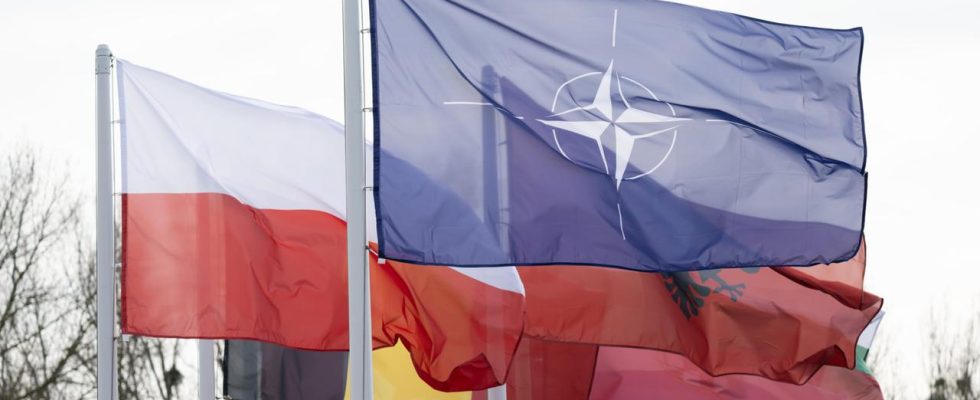“No Action, Talk Only”: NATO was long considered a relic of the Cold War. 75 years after its founding, the North Atlantic Treaty is under pressure from within and without – and has to face tough fundamental questions.
The guest of honor fits into a briefcase. For the 75th anniversary celebrations in Brussels, the founding document, the North Atlantic Treaty, was flown in from Washington on a commercial airliner. It was signed there on April 4, 1949 by the heads of state and government of twelve countries – including the United States of America. Then-President Harry S. Truman spoke for them:
The nations that sign the document are committed to the peaceful principles of the United Nations, they maintain friendly relations and economic cooperation, and when one’s territory or independence is threatened, they come to its aid.
There it is, the famous Article 5, the support article, all for one. Back then, no one could have imagined that 75 years later, Donald Trump, of all people, a former US president, would question him.
Signing of the NATO founding act in Washington – Germany only joined six years later.
The Federal Republic of Germany joins in 1955
There were twelve states that wanted to bring peace and freedom to the European continent under the influence of two world wars. In the end, NATO emerged primarily out of fear of increasing Soviet aggression. On the other hand, Europe wanted to have the strong partner USA as an ally. West against East, communism against capitalism – the enemy for NATO has lived in Moscow since the beginning.
At the center of the East-West conflict: divided Germany. The Federal Republic was admitted a few years later, on May 9, 1955, one day after the anniversary of Nazi Germany’s surrender. It was mainly due to the then Federal Chancellor Konrad Adenauer that the countries that were invaded and occupied by Germany trusted this country again.
Adenauer thanked him in German: “The federal government is determined to stand up for peace and freedom with the other member states. I know that the entire German people feels and thinks this way. Even the 18 million who are still unable to express themselves freely to decide freely about their fate” – this meant the residents of the German Democratic Republic (GDR). A few days later, on May 14, 1955, the Soviet Union founded the Warsaw Pact, of which the GDR became a member, along with other communist states from Central, Eastern and Southeastern Europe.
2001: The USA declares an alliance
NATO versus Warsaw Pact: A balance of terror was established. Both alliances had enough nuclear weapons to destroy each other. And yet there were always disarmament negotiations. In December 1979, the member states passed the so-called NATO double decision. While negotiations were underway with the Soviet Union about dismantling missiles, the USA was able to station intermediate-range nuclear missiles in Europe again. Fear of a renewed arms race drove tens of thousands onto the streets.
Even though NATO was created as a defensive alliance, it repeatedly intervened in conflicts: in Kosovo in 1999, later in Afghanistan, in Somalia: NATO troops often took part in operations under the leadership of the USA.
The Americans were also the only ones to ever invoke Article 5, the mutual assistance clause: in response to the 2001 attack on the World Trade Center, they asked their allies to support them in the fight against the Al-Qaeda terrorist network .
“No Action, Talk Only”?
The fight against terror seemed to become NATO’s task in the new millennium. After the collapse of the Soviet Union and the accession of many Eastern European states, the alliance felt secure. A period of financial and military inertia began.
NATO – “No Action, Talk Only” is how the four letters are translated according to a common joke at the time. French President Emmanuel Macron even described the defense alliance as “brain dead” in a newspaper interview in 2019.
NATO seemed like a fed up lion that no longer has any enemies. But then a big game hunter came along with a bare chest and shook the alliance awake: Under Vladimir Putin, Russia attacked Ukraine, which years earlier had written entry into NATO as a goal in its constitution.
Time of unrest
And unrest has also broken out internally: US President Trump made it loudly clear that he wanted to see more money from the member states, even toyed with the idea of leaving NATO and threatened in the current presidential election campaign: higher contributions were the condition for this The USA is fulfilling its obligation to provide assistance – if you don’t pay, you won’t be protected in the event of an attack.
Even if it is not yet clear who will win the US election in 2024: In response, NATO wants to become more independent of the USA with a new strategy – that is also a historic step.
As with many anniversaries, the actual holiday at the NATO headquarters in Brussels is kept rather small: there is cake for everyone, speeches and a remembrance of the fallen soldiers. The big party will take place in July: at the NATO summit in Washington. Hopefully then we will know who the next NATO chief will be. Allianz won’t know who will move into the White House and with what motto until November. It is becoming apparent that there will be little time for a sentimental look back on the anniversary.

